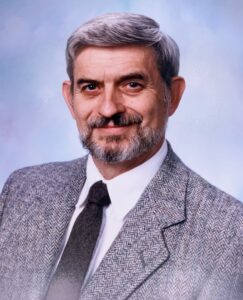 “He cared when no one else did. He not only took the time to figure out what was wrong but listened to what I had to say no matter how crazy I may have sounded. Dr. Templin is a rare type of doctor—he’s the type that clearly loves his career and patients to the core,” said a former patient of David W. Templin, MD.
“He cared when no one else did. He not only took the time to figure out what was wrong but listened to what I had to say no matter how crazy I may have sounded. Dr. Templin is a rare type of doctor—he’s the type that clearly loves his career and patients to the core,” said a former patient of David W. Templin, MD.
The quotation above summarizes what patients and colleagues thought of Dr. Templin, a rheumatologist who practiced at the Alaska Native Medical Center for over 50 years.
Dr. Templin died in June this year, having retired from his practice of rheumatology in 2022 at the age of 89.
A Little Background
Dr. Templin was born in Billings, Mont., to a church planter/itinerant preacher and a schoolteacher. He attended Wheaton College, Illinois, and completed his medical training at the University of Washington, Seattle.
Dr. Templin was commissioned through the U.S. Public Health Service and had his first assignment on the Hopi Reservation in Arizona. After moving between Phoenix and Seattle with his wife and children, he moved the family to Anchorage in 1970. At that time, he promised his wife they would only stay for five years.
Ultimately, he stayed there the rest of his career.
Dr. Templin frequently traveled to regional villages to work with the Alaska Native population, bringing healthcare to the people instead of having them come to Anchorage. This typically meant flying several hundred miles to reach patients, usually on a commercial airline but sometimes also traveling by small plane or ferry. He would often end up staying in unique living arrangements without the usual traveler’s amenities.
He would typically hold clinics for two to five days at a stretch. This included visiting remote areas of Alaska as recently as the summer of 2020, visiting patients in places like Nome, Metlakatla and Kodiak. Primary care providers would help monitor patients between Dr. Templin’s visits, which were typically twice a year. All of this was in addition to regular clinics in Anchorage.
At age 76, in 2009, Dr. Templin was still providing care to 16 field clinic locations throughout Alaska, twice a year. The clinics were 250 to 900 miles away. In 2009, when nominating him for an ACR award, Elizabeth Ferucci, MD, MPH, wrote, “I don’t know any other clinician so dedicated to patient care that he is willing to spend 32 weeks out of the year in remote towns or villages away from family in order to provide clinical care to patients.” Dr. Ferucci works with the Alaska Native Tribal Health Consortium in Anchorage.




